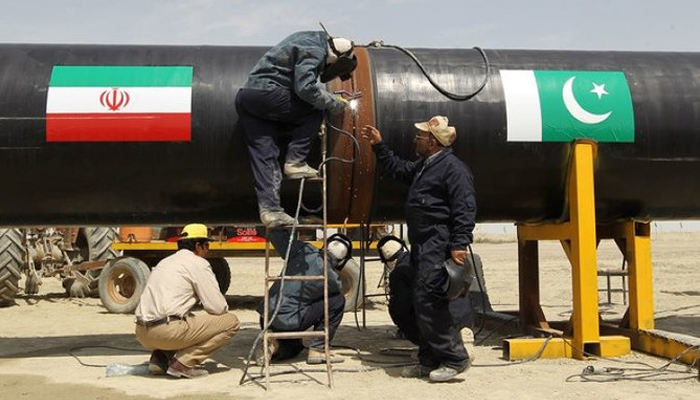Pakistan has expedited IP gas pipeline talks: official
Negotiations for the project have gained momentum over the past year, officials disclosed
ISLAMABAD: Pakistan has expedited talks on the Iran-Pakistan gas pipeline, but significant commercial and foreign concerns pose substantial challenges to the realisation of this vital energy initiative, as per a high-ranking government official who briefed a parliamentary panel on Wednesday.
The Senate’s Standing Committee on Cabinet Secretariat, chaired by Senator Saadia Abbasi, convened to inquire about the status and outlook of the IP gas pipeline project.
Negotiations for the project have gained momentum over the past year, officials disclosed. However, formidable hurdles in the form of commercial and foreign concerns still impede its completion. In response, the committee has opted to involve the Attorney General of Pakistan in the next meeting to delve deeper into the matter.
During the Senate Committee session, members were also briefed on the recent electricity price increases and their repercussions on the general populace.
Chairman of the National Electric Power Regulatory Authority (Nepra) affirmed that the regulator’s primary mandate was to furnish consumers with secure and cost-effective electricity rates. Currently, consumers are being billed at a rate of Rs45.06 per unit, including various components such as capacity charges, energy charges, and margins for power distribution companies (DISCOs), with taxes being a significant portion of the total cost.
Nevertheless, the latest macroeconomic data led to a rise of Rs3.17 per unit. Additionally, he stated that the nation’s overall electricity generation capacity stands at approximately 44,000 megawatts (MW), with an average current production ranging from 25,000 to 26,000 MW. Of this total, IPPs contribute 70 percent.
Senator Mushtaq Ahmad Khan asked if Nepra was responsible for granting Power Generation licenses to Independent Power Producers (IPPs). Chairman Nepra clarified that these licenses are issued by the Government of Pakistan.
Senator Mushtaq insisted that the country’s energy crisis cannot be solved without reviewing the agreements with IPPs, which he described as problematic. He pointed out that Nepra hasn’t effectively ensured affordable energy for local consumers as it should and, instead, it has mainly protected the interests of IPPs.
Senator Saadia Abbasi directed Nepra to provide detailed information about the Fuel Price Adjustment charges and Capacity Payments made to IPPs in the year 2023.
Additionally, the Senate committee discussed the proposed rise in gas prices and its usage across the country. Officials reported that the country’s natural gas production totals approximately 2,900 million cubic feet (MMcf), comprising 400 MMcf from Khyber Pakhtunkhwa, 750 MMcf from Balochistan, 100 MMcf from Punjab, and 1,650 MMcf from Sindh.
Furthermore, they noted that the power sector consumes an average of 28 percent of the gas, with 26 percent used domestically, 18 percent in the industrial sector and 22 percent by fertilizer companies.
-
 Breezy Johnson Engaged At Olympics After Emotional Finish Line Proposal
Breezy Johnson Engaged At Olympics After Emotional Finish Line Proposal -
 King Charles Wants Andrew To 'draw A Line' Under Epstein Issue
King Charles Wants Andrew To 'draw A Line' Under Epstein Issue -
 John Wick Game Confirmed With Keanu Reeves And Lionsgate Collaboration
John Wick Game Confirmed With Keanu Reeves And Lionsgate Collaboration -
 Gigi Hadid Feels 'humiliated' After Zayn Malik's 'pathetic' Comment: Source
Gigi Hadid Feels 'humiliated' After Zayn Malik's 'pathetic' Comment: Source -
 Olympics Men Hockey Game: McDavid, Crosby Power Canada Past Czechia
Olympics Men Hockey Game: McDavid, Crosby Power Canada Past Czechia -
 Sony PlayStation State Of Play Reveals 'Castlevania' And 'Metal Gear' Return
Sony PlayStation State Of Play Reveals 'Castlevania' And 'Metal Gear' Return -
 Ontario Tuition Freeze Ends, Allowing Colleges And Universities To Raise Fees
Ontario Tuition Freeze Ends, Allowing Colleges And Universities To Raise Fees -
 King Charles Should Apologise To All Rape Victims, Says New Poll
King Charles Should Apologise To All Rape Victims, Says New Poll -
 Cardi B Shares Emotional Message Amid Stefon Diggs Split Rumors
Cardi B Shares Emotional Message Amid Stefon Diggs Split Rumors -
 James Van Der Beek’s 'heartbroken' Ex Wife Breaks Silence Of His Death
James Van Der Beek’s 'heartbroken' Ex Wife Breaks Silence Of His Death -
 Sarah Ferguson, Shamed Andrew Spotted In ‘family Costume Drama’
Sarah Ferguson, Shamed Andrew Spotted In ‘family Costume Drama’ -
 Kylie Kelce Reveals Why She Barely Planned Her Wedding Day?
Kylie Kelce Reveals Why She Barely Planned Her Wedding Day? -
 Why Shamed Andrew Called His Victims ‘Mrs Windsor’
Why Shamed Andrew Called His Victims ‘Mrs Windsor’ -
 Kate Hudson Explains Why Acting Isn't Discussed At Home
Kate Hudson Explains Why Acting Isn't Discussed At Home -
 Prince William, Kate Middleton Epstein Statement Was AI Generated, Says Expert
Prince William, Kate Middleton Epstein Statement Was AI Generated, Says Expert -
 Sarah Ferguson On Her Way To Hurt 'only Two People Who Care About Her'
Sarah Ferguson On Her Way To Hurt 'only Two People Who Care About Her'




